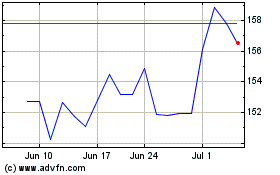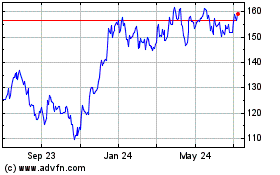Two Loan-Growth Hot Spots For Banks: Cars And Students
April 23 2010 - 4:44PM
Dow Jones News
Universities and car dealerships have something in common: Their
customers are behind two rare examples of increased lending by
banks.
A number of big U.S. lenders, including J.P. Morgan Chase &
Co. (JPM) and Wells Fargo & Co. (WFC), said both their auto and
student lending increased markedly during the first quarter.
Weak lending by banks has been a hallmark of the financial
crisis. The amount of loans outstanding from banks has fallen at
the fastest rate in decades.
But now, banks with capital to lend are pushing to make more
loans to both car buyers and higher-education students. For good
reason: The credit crisis wiped out competition in both industries.
Meanwhile, the beginnings of an economic rebound have helped more
car owners stay current on their loan payments.
"Many other lending institutions have not had the capital
available to lend and have had to withdraw from certain parts of
the student-loan market," said Thomas Lustig, president of
education lending at PNC Financial Services Group Inc. (PNC) The
Pittsburgh regional bank's student loans rose for a fourth straight
quarter, up 62% over a year ago.
In the run-up to the credit bubble, big and mid-size banks
turned impressive profits by originating loans of all types, and
then quickly selling those loans to other investors. They collected
fees in the process, known formally as securitization.
Now, with securitization investors still smarting from a
credit-boom hangover, lenders are pushing back into traditional
banking businesses--such as writing and holding consumer loans--to
generate future sources of earnings. Auto and student loans mark
two of the first examples of that down-shift to write-and-hold
lending.
Basic economics are also revving up the growth of both types of
loans. For starters, rank-and-file consumers often make a priority
of keeping current on their car payments, especially for cruising
to and from work. Tax-refund season is also helping to put the
brakes on delinquencies, according to Fitch Ratings, while
improving prices for used cars are increasing loan-collections
rates, reassuring lenders about the safety of making new loans.
In education lending, bankers say the recession has motivated
Americans to return to school, either by choice or by necessity.
Sweeping federal legislation will soon exclude banks from making
federal student loans, but they will still be allowed to make
higher-cost private loans.
Complete quarterly data for the banking industry won't be
available for weeks. But SNL Financial tracks data for 19 banks of
diverse sizes that specifically report their holdings of vehicle
loans. That group reported its third consecutive quarterly rise in
vehicle loans, up 9% over last June.
At San Francisco-based Wells Fargo, total auto loans rose 5.8%
in the first quarter over the fourth quarter. Wells Fargo's loans
to auto dealers themselves rose 41% in the last quarter alone, and
the bank said delinquencies among auto loans stabilized in the
middle of last year--far faster than most loan types have recovered
during the financial crisis. Wells Fargo's student loans grew
3.5%.
J.P. Morgan is currently the largest auto lender in the country,
and its total loans rose for the third straight quarter, up 10.5%
since the end of June. One reason for the turbo-charged performance
of the New York bank's car-loan holdings: sputtering competition
from weakened car companies' financing arms.
J.P. Morgan's student loans also rose for the third straight
quarter.
-By Marshall Eckblad, Dow Jones Newswires; 212-416-2156;
marshall.eckblad@dowjones.com
PNC Financial Services (NYSE:PNC)
Historical Stock Chart
From Oct 2024 to Nov 2024

PNC Financial Services (NYSE:PNC)
Historical Stock Chart
From Nov 2023 to Nov 2024
